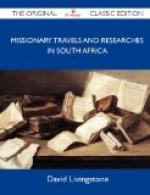While waiting for the recovery of my men, I visited, in company with my friend Mr. Canto, the deserted convent of St. Hilarion, at Bango, a few miles northwest of Golungo Alto. It is situated in a magnificent valley, containing a population numbering 4000 hearths. This is the abode of the Sova, or Chief Bango, who still holds a place of authority under the Portuguese. The garden of the convent, the church, and dormitories of the brethren are still kept in a good state of repair. I looked at the furniture, couches, and large chests for holding the provisions of the brotherhood with interest, and would fain have learned something of the former occupants; but all the books and sacred vessels had lately been removed to Loanda, and even the graves of the good men stand without any record: their resting-places are, however, carefully tended. All speak well of the Jesuits and other missionaries, as the Capuchins, etc., for having attended diligently to the instruction of the children. They were supposed to have a tendency to take the part of the people against the government, and were supplanted by priests, concerning whom no regret is expressed that they were allowed to die out. In viewing the present fruits of former missions, it is impossible not to feel assured that, if the Jesuit teaching has been so permanent, that of Protestants, who leave the Bible in the hands of their converts, will not be less abiding. The chief Bango has built a large two-story house close by the convent, but superstitious fears prevent him from sleeping in it. The Portuguese take advantage of all the gradations into which native society has divided itself. This man, for instance, is still a sova or chief, has his councilors, and maintains the same state as when the country was independent. When any of his people are guilty of theft, he pays down the amount of goods stolen at once, and reimburses himself out of the property of the thief so effectually as to be benefited by the transaction. The people under him are divided into a number of classes. There are his councilors, as the highest, who are generally head men of several villages, and the carriers, the lowest free men. One class above the last obtains the privilege of wearing shoes from the chief by paying for it; another, the soldiers or militia, pay for the privilege of serving, the advantage being that they are not afterward liable to be made carriers. They are also divided into gentlemen and little gentlemen, and, though quite black, speak of themselves as white men, and of the others, who may not wear shoes, as “blacks”. The men of all these classes trust to their wives for food, and spend most of their time in drinking the palm-toddy. This toddy is the juice of the palm-oil-tree (’Elaeis Guineensis’), which, when tapped, yields a sweet, clear liquid, not at all intoxicating while fresh, but, when allowed to stand till the afternoon, causes inebriation and many crimes. This toddy, called malova, is the bane of the country. Culprits are continually brought before the commandants for assaults committed through its influence. Men come up with deep gashes on their heads; and one, who had burned his father’s house, I saw making a profound bow to Mr. Canto, and volunteering to explain why he did the deed.




